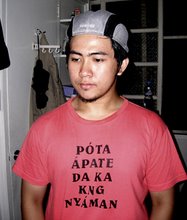I was not really proficient in speaking Kapampangan six months ago. Although my parents and other relatives at home spoke to me in Kapampangan, they never bothered to correct my occasional incorporation of Tagalog words in my sentences, such as "Malakas [masikan] ya" or "Makainis [makasora/makasnuk] ya."
Whenever we visit relatives at Porac, of course, we would converse in Kapampangan, but only about the folk and traditional stuff -- how old I am, how I am doing with my studies, where this person is, whether this person has gone abroad or not, if my Ima's health is okay, etc.
But barely have I spoken in Kapampangan about, for example, the superstring theory of the universe, the consequences of religion, faith VS reason, mass media ethics -- except with my big brother, who likewise bothers not if we spoke hybrid Kapampangan. Of course, these topics usually see the limelight of public venues in schools, the preferred languages of which are English and the so-called Filipino (Tagalog). Formal and informal essays are required only in English and Tagalog.
Such situation contributes to the decline in the intellectualization of a language, which might lead to language stagnation (no development but remains at home or folk traditions) or deterioration (decline in number of speakers until extinction of the language). Frenchmen have a word for the computer: ordinateur. What does Filipino have? Kompyuter. Kapampangans, in this period of nationalization in the Philippines, will mostly likely follow what Filipino uses.
For globalization: globalisasyon. Folks at Amanung Sisuan have started to use the word Meto yatu to refer to globalization. Meto yatu means "all the world."
Fascinatingly, some languages give labels to concepts that other languages have no words for. Like, for example, in the Philippines, we have pengagli (Tagalog: pinaglihi). I used this word in my short digital film. Up to this time, I have no idea how to subtitle the sentence containing the word pengagli.
"Itang anak a ita, pane yang marinat. Balamu pengagli ya keng gabun."
"That child is always filthy. His mother must have liked eating soil when she was still carrying him in her womb during her pregnancy; that's why when the child was born, the child inherited physical characteristics related to soil."
Quite long, huh? Of course, this concept is quite non-scientific, like mapapa (to be punished by God, especially the Christian God). However, there are other words that are timeless, like maglualu (to go out in defense of the helpless), balasbas (one who takes the path less traveled), tangka (property acquired by a person through the years), mikapsuan (for a person with fever to sweat out some heat upon intake of medicine or accomplishment of a therapeutic activity, causing the lowering of body temperature), and dugu (a word inserted in a sentence to express sympathy to the one being talked of).
Since it is the youth and academicians that grasp new concepts, it is up to them to label those concepts in their own tongue. If this is not done, Kapampangan is bound to be a stagnant language meant only for use in farms, fishponds, piggeries, home-based conversations, feasts, and family reunions. We would not feel confident in using Kapampangan to discuss filming, computer engineering, architecture, art studies, chemistry, new media, philosophy, social studies, and other topics.
But before delving into the new concepts, we should learn first the basics. How? By talking, writing, and reading in Kapampangan. Most materials have been written by elders or from people way back in the past. When you have already learned the language, you may then use the language to express episodes of your life in this modern era.
Watch this and see if you can understand the speaker, not to mention, appreciate the accent. I am surprised that I understand the whole thing; six months ago, I couldn't have possibly understood the words panyarul and maligua't salita.
Alben meng manyaman, boy!
Subscribe to:
Post Comments (Atom)








3 comments:
just want to comment about this
"Itang anak a ita, pane yang marinat. Balamu pengagli ya keng gabun."
ur translation was good
but i found it a bit inaccurate
actually it's only your translation with the word pengagli thats bothering me, as far as i know pengagli or pinaglihi in tagalog doesnt necessarily mean to that you have inherited a certain characteristic of what ur mother ATE during her pregnancy,
i admit that MOST of it is related to eating something but not all of it.
Paglilihi in our culture could also be incorporated with seeing something smelling it or just feeling it not necessarily tasting or eating it if u know what i mean
hehe its just funny and bothering when u said that her mom liked eating soil i mean who would like to eat soil lol
well i hope u understand what im trying to say thank you
^ was translating the sentence based on the context of the story and the setting, referring to paglilihi based on what was eaten, where the child inherits the characteristics of what was eaten. like if your Dad has two thumbs, his mom could have liked eating fried fish tails during her pregnancy.
and of course, the 'pengagli ya kng gabun' was figurative.
as said, it's a translation of the line, not a definition or explanation of the whole concept. even morning sickness is part of 'paglilihi.' :)
my translation was incomplete, not inaccurate. :)
cheers.
good job....keep it up!
Post a Comment